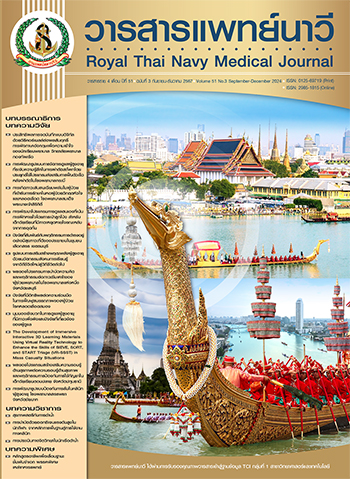Psychology of Submariners
Main Article Content
Abstract
Mental health problems in submariners are a critical concern within the field of submarine medicine due to the high-risk nature of submarine operations. The unique conditions in which submarines operate increase their susceptibility to developing mental health problems. Compounding this issue is the limited access to medical services, particularly psychiatric treatment, while submerged. The presence of mental health problems or disorders during submarine missions inevitably compromises the safety of both submariners and submarine assets. Therefore, conducting thorough psychological evaluations is of paramount importance in submarine medicine. These evaluations aid in the selection of individuals with specific characteristics suitable for underwater operations, thereby preventing or reducing the risk of mental health problems that may arise. A comprehensive assessment of the factors that may impact submarine mental health is essential in all dimensions. Such assessments provide valuable information for formulating policies on psychological assessments, procuring or developing psychological tests for submariners, and preparing for the mental health needs of submarines. Additionally, these assessments offer important concepts that can be utilized to design programs aimed at enhancing mental performance in a tangible way. These programs promote mental resilience within submarines and equip personnel with the skills necessary to effectively manage stress in high-pressure underwater situations. Ultimately, these efforts contribute to the successful execution of submarine missions and the achievement of the Royal Thai Navy goals.
Article Details

This work is licensed under a Creative Commons Attribution-NonCommercial-NoDerivatives 4.0 International License.
References
Submarine Fleet. Fundamentals of submarine operations. [Lecture Handout]. Chonburi: Royal Thai Fleet; 2014
Sripootorn W. Guidelines for promoting mental competence in the personnel of the Royal Thai Navy submarines. [Director's Consideration Documents, Naval Command and Staff Course]. Nakhon Pathom: Department of Naval Education; 2022. (in Thai)
Hu C. Liu Y, Zhao F, Xu Z, Zhang L. The self-perceived mental health status and factors that influence the mental health of Chinese submariners in the South China sea: a cross-sectional study. Mil Med 2022;187(5-6):e696-701.
Sripootorn W. A study of psychopathology, personality and coping skills in submarine personnel of the Royal Thai Navy, [Research Paper, Naval Command and Staff Course]. Nakhon Pathom: Department of Naval Education; 2022. (in Thai).
Department of Mental Health. Standards for practicing the art of healing in clinical psychology. Bangkok: Art Qualify; 2014. (in Thai).
Shobe K, Bing M, Duplessis C, Dyche J, Fothergill D, Horn W, et. al. Psychological, physiological, and medical impact of the submarine environment on submarines with application to Virginia Class Submarines. NavSubMedRschLab 2003:1-78.
Beardslee LA, Lawson BD, Regis DP. An overview of the Unique Field of Submarine Medicine. NavSubMedRschLab 2019:1-23.
Saad A, Kala C, Ohayon S, Feldman L, Galili E, Yanir Y, et al. Assessment of the risk of fractures because of service on diesel submarines: a retrospective cohort study. Mil Med 2015;180(7):787-91.
Van Wijk CH. Psychological considerations in submarine escape training: brief overview and future directions. Int Marit Health 2017;68(3):168-73.
Van Wijk CH. An historical perspective on submariner selection in the South African Navy. South African Journal of Psychology 2007;37(4):878-92.
Van Wijk CH. Personality Characteristics of South African Navy submarine personnel. Mil Med 2000;165(9):656-8.
Moes GS, Lall R. Jonhson WB. Personality characteristics of successful Navy submarine personnel. Mil Med 1996;161(4):239-42.
Van Wijk CH. Coping in context: dispositional and situational coping of Navy divers and submariners. Journal of Human Performance in Extreme Environments 2017;13(1): 2327-937.
Kim HS. Understanding good coping: a submarine crew coping with extreme environmental conditions. Journal of Human Performance in Extreme Environments 2011;9(2):961-7.
Snyder CR. Handbook of hope. Diego, CA: Academic Press; 2000.
Sturma M. Stress to the ultimate degree: coping with danger on U.S. submarines during the Second World War. International Journal of Maritime History 2020; 32(1):88-100.
Royal Thai Fleet. Memorandum, Confidential 713/2021 “Requesting approval for conducting the civil servant selection examination to be a submarine personnel”. The Royal Thai Navy. 2 Jun 2021. (in Thai).
Somdet Chaopraya Institute of Psychiatry. Clinical psychological diagnostic standards. Bangkok: Somdet Chaopraya Institute of Psychiatry; 2009. (in Thai).
Van Wijk CH. Coping in context: dispositional and situational coping of Navy divers and submariners. Journal of Human Performance in Extreme Environments 2017;13(1):2327-937.
Noomsang T, Tuntrarungroj T. Testing the validity and reliability of the Thai version of the Short Stress Coping Strategies Assessment Questionnaire. Journal of the Psychiatric Association of Thailand 2018;63(2):189-198. (in Thai).
Schlichting C. Psychiatric screening for the submarine service: enlisted personal. NavSubMedRschLab 1993:1-16
Theriaque DW, Schlichting C. Reliability of the subscreen psychological screening inventory. NavSubMedRschLab 1997:1-10.
Da S, He Y, Zha ng Z. Effectiveness of psychological capital intervention and its influence on work-related attitudes: daily online self-learning method and randomized controlled trial design. Int J Environ Res Public Health 2020 25;17(23):8754.


